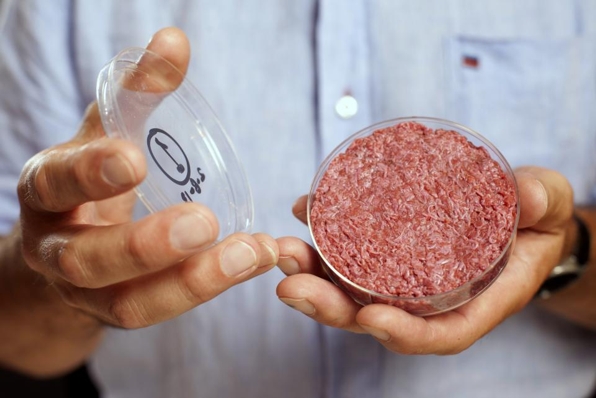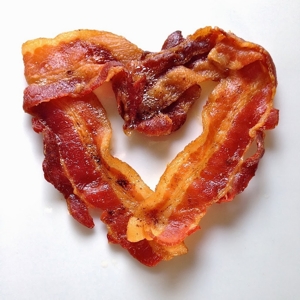You may have heard that some parts of the U.S. are facing a temporary Bacon shortage. Fear not, Bacon lovers! According to a recent article in the journal Nature, scientists are close to cloning it. That should make Pigs everywhere breathe a sigh of relief. And it may be just the beginning…
 Lab-cultured Meat. Still five years away, or more, from your local Supermarket…
Lab-cultured Meat. Still five years away, or more, from your local Supermarket…
‘Cultured’ Meat products have already made their appearance on the market, but only in small quantities. Memphis Meats in TN has been making ‘Meatballs and ‘Fajita Meat’ grown in a lab from stem sells for some time, to great acclaim from the environmentally conscious. Even PETA bought shares in the company.
Why?
Those-who-ought-to-know say it takes 19 lb. / 8.5 kg of grain and 90 gal. / 360 L of water to produce just one lb. / 0.45 kg of Beef or Pork the traditional way – by raising cows and pigs on the farm. ‘Cultured’ Meats require something like 90 per cent less feed and water to produce the same amount of lean protein. Now, that’s a win-win-win situation all-round!
The up side has many aspects…
Imagine a near-future where even those who refuse to eat ‘anything with a face’ could enjoy a big, juicy Hamburger guiltlessly! Lab-grown meats could reliably be kept disease- and germ-free from inception to the package. Slaughterhouse waste would be a thing of the past. Pollution from fertilizer and animal waste runoff would no longer threaten our fresh water supplies. No more agricultural-sector contributions to the green house gas problem. More grain available for human consumption…
The downside is also mutli-faceted…
First, the Meat culturing process is still about 5 years away from the marketplace. For example, the first Memphis Meats Meatball, ‘smaller than a golfball’, was estimated to have cost (US)$1,200 to make. And the fist Burger patty produced by researcher Mark Post of Maastricht University in the Netherlands of was said to have cost (US)$320,000. Let’s hope for mega-cost reductions from scaling the process up!
Second, One size does not fit all. That is, markedly different techniques appear to be needed to grow different kinds of Meats in the lab. And they must all be developed from the ground up.
However…
Paul Mozdziak, a cell culture techniques researcher at North Carolina State University, is working on growing Turkey cells, which he says may be easier than culturing more complex Beef or Pork muscle cell structures.
Meanwhile, on the Bacon front…
The authors of the Nature paper say they’re confident that a variety of Pig cell structures can eventually be grown in commercially viable quantities at competitive prices. Even Pork Belly, which is the basic component of Bacon. Imagine that!
~ Maggie J.

